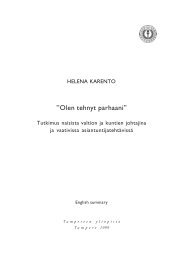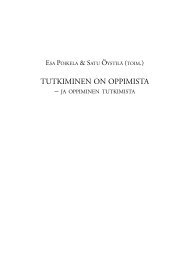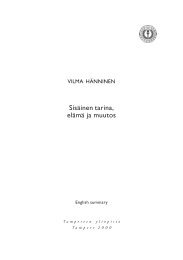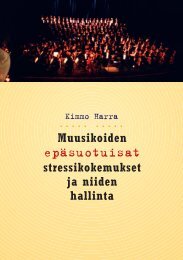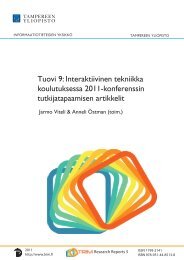Note on this edition: this is an electronic version of the 1999 book ...
Note on this edition: this is an electronic version of the 1999 book ...
Note on this edition: this is an electronic version of the 1999 book ...
Create successful ePaper yourself
Turn your PDF publications into a flip-book with our unique Google optimized e-Paper software.
266Dem<strong>on</strong>ic Texts <strong>an</strong>d Textual Dem<strong>on</strong>sCreator, he also develops <strong>the</strong> oppositi<strong>on</strong> between secular ficti<strong>on</strong> <strong>an</strong>d sacredscripture which <strong>is</strong> accentuated in <strong>the</strong> Jahilia ep<strong>is</strong>odes. These secti<strong>on</strong>s areframed by Gibreel Far<strong>is</strong>hta’s struggle with h<strong>is</strong> faltering religious identity.Gibreel has in h<strong>is</strong> numerous roles establ<strong>is</strong>hed himself as <strong>the</strong> pers<strong>on</strong>ificati<strong>on</strong><strong>of</strong> <strong>the</strong> divine. H<strong>is</strong> supernatural experiences, however, begin <strong>on</strong>ly afterhe has lost h<strong>is</strong> former faith due to a mysterious d<strong>is</strong>ease: Gibreel feelswr<strong>on</strong>gly pun<strong>is</strong>hed, <strong>an</strong>d h<strong>is</strong> protests allude to <strong>the</strong> sorrows <strong>of</strong> Job <strong>an</strong>d <strong>the</strong> classicproblem <strong>of</strong> God’s cruelty. As <strong>an</strong> “<strong>an</strong>ti-Job,” Gibreel <strong>is</strong> released from h<strong>is</strong>sufferings <strong>on</strong>ly after he has renounced God. As h<strong>is</strong> first act after leaving <strong>the</strong>hospital, he goes into a hotel <strong>an</strong>d eats pig meat, as <strong>the</strong> palpable evidence <strong>of</strong>tr<strong>an</strong>sgressing <strong>the</strong> limits <strong>of</strong> h<strong>is</strong> former identity. 48 There <strong>is</strong> a way <strong>of</strong> reading<strong>the</strong> novel that follows <strong>the</strong> compar<strong>is</strong><strong>on</strong> <strong>of</strong> religi<strong>on</strong> with illness: when Gibreel<strong>is</strong> cured, he also recovers from <strong>the</strong> d<strong>is</strong>ease <strong>of</strong> Faith. As <strong>the</strong> tormenting religiousv<strong>is</strong>i<strong>on</strong>s start, <strong>the</strong>y are <strong>an</strong> indicati<strong>on</strong> <strong>of</strong> Gibreel’s failing mental health;as Gibreel accepts <strong>the</strong> reality <strong>of</strong> <strong>the</strong> supernatural, he <strong>is</strong> also described as losingh<strong>is</strong> touch with a shared reality, <strong>an</strong>d falling into a psychos<strong>is</strong>. GibreelFar<strong>is</strong>hta <strong>is</strong> <strong>the</strong>reby not just a “good” character as opposed to <strong>the</strong> “evil” SaladinChamcha – despite <strong>the</strong>ir haloes <strong>an</strong>d horns, respectively. As <strong>the</strong>y are describedin <strong>the</strong> beginning as falling intertwined toge<strong>the</strong>r from <strong>the</strong> skies, so<strong>the</strong>y should be read as interrelated <strong>an</strong>d complementary figures in <strong>the</strong>ir hybrididentities. Chamcha with h<strong>is</strong> bowler hat <strong>an</strong>d Brit<strong>is</strong>h accent represents adenial <strong>an</strong>d break with h<strong>is</strong> original identity <strong>an</strong>d Indi<strong>an</strong> culture; Far<strong>is</strong>hta differsfrom him by h<strong>is</strong> tighter b<strong>on</strong>ds with h<strong>is</strong> religious identity. These twocharacters are <strong>of</strong>fered as starting points for <strong>the</strong> narrative which studies <strong>the</strong>effects <strong>of</strong> tr<strong>an</strong>siti<strong>on</strong> <strong>an</strong>d hybridity. The events during <strong>the</strong>ir migrati<strong>on</strong> explore<strong>an</strong>d comment <strong>on</strong> <strong>the</strong> break with <strong>the</strong> “original” (<strong>the</strong>ir cultural c<strong>on</strong>text,<strong>an</strong>d <strong>the</strong>ir original selves as produced by <strong>th<strong>is</strong></strong> c<strong>on</strong>text). In <strong>an</strong> import<strong>an</strong>t secti<strong>on</strong>towards <strong>the</strong> latter part <strong>of</strong> <strong>the</strong> novel <strong>the</strong> narrator makes a metaficti<strong>on</strong>alcommentary <strong>on</strong> <strong>th<strong>is</strong></strong> div<strong>is</strong>i<strong>on</strong>:Well, <strong>the</strong>n. – Are we coming closer to it? Should we even say that <strong>the</strong>se aretwo fundamentally different types <strong>of</strong> self? Might we not agree that Gibreel,for all h<strong>is</strong> stage-name <strong>an</strong>d perform<strong>an</strong>ces; <strong>an</strong>d in spite <strong>of</strong> born-again slog<strong>an</strong>s,new beginnings, metamorphoses; – has w<strong>is</strong>hed to remain, to a largedegree, c<strong>on</strong>tinuous – that <strong>is</strong>, joined to <strong>an</strong>d ar<strong>is</strong>ing from h<strong>is</strong> past; – that hechose nei<strong>the</strong>r near-fatal illness nor tr<strong>an</strong>smuting fall; that, in point <strong>of</strong> fact,he fears above all things <strong>the</strong> altered states in which h<strong>is</strong> dreams leak into,<strong>an</strong>d overwhelm, h<strong>is</strong> waking self, making him that <strong>an</strong>gelic Gibreel he has nodesire to be; – so that h<strong>is</strong> <strong>is</strong> still a self which, for our present purposes, wemay describe as ‘true’ … whereas Saladin Chamcha <strong>is</strong> a creature <strong>of</strong> selected48 SV, 28-30. Gibreel’s d<strong>is</strong>ease probably has its model in <strong>the</strong> illness <strong>of</strong> <strong>the</strong> famous Bombaymovie star, Amitabh Bach<strong>an</strong>; <strong>the</strong>re are several comm<strong>on</strong> features between Rushdie’sficti<strong>on</strong> <strong>an</strong>d <strong>th<strong>is</strong></strong> case (for details, see Timothy Brenn<strong>an</strong>, Salm<strong>an</strong> Rushdie <strong>an</strong>d <strong>the</strong> ThirdWorld, 1989; cf. Seminck 1993, 24). The ep<strong>is</strong>ode with pig’s meat has <strong>an</strong>(auto)biographical bas<strong>is</strong>; Rushdie has described how he proved h<strong>is</strong> new-found a<strong>the</strong><strong>is</strong>m at<strong>the</strong> age <strong>of</strong> fifteen by buying himself a “ra<strong>the</strong>r tasteless ham s<strong>an</strong>dwich” (“In God WeTrust,” 1985, 1990; 1992, 377). Rushdie’s biography <strong>is</strong> d<strong>is</strong>cussed in Wea<strong>the</strong>rby 1990.



